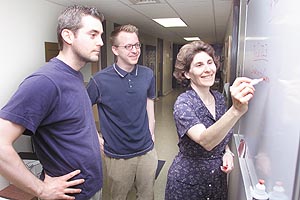Marsha Rosner, the Charles B. Huggins Professor and Director of the Ben May Institute for Cancer Research
By John EastonMedical Center Public Affairs
 Marsha Rosner and her two graduate assistants, Kevin Corbit (left) and Nicholas Trakul (middle). |
Whatever she does must work. Her course on cancer biology, which she created five years ago, has grown in popularity. It has even gotten crowded. “I think 40 students, split into three discussion groups, is about right,” said Rosner, the Charles B. Huggins Professor and Director of the Ben May Institute for Cancer Research. Last year 70 students enrolled, so this year she made an up-front effort to scare a few of the less committed away. “This is a tough class,” she told them at the first session. “It is hard. It is not a gut. It is much more like a graduate course. You have to want to be challenged.”
The class is challenging, she admits, but students find it fascinating. The course emphasizes how cancer research is done and what scientists have learned. Instead of a text, students read recent journal articles, a special all-cancer issue of Scientific American, and Natural Obsessions, a book by New York Times science writer Natalie Angier. The book, a chronicle of one laboratory’s struggles, is written more like a detective story than a science tome. Angier spent more than a year observing a high-profile cancer-genetics lab, watching and taking notes as the researchers, post-doctoral candidates and graduate students picked apart the subtle biological differences between normal and cancerous cells.
“As a text, it’s a bit unorthodox,” admits Rosner, “but it gives students a sense of how we know what we know about cancer and why we can do what we do. It also gives them a sense of the adventure of cancer research, the process of scientific discovery and the politics of research and publication.”
The course is very “problem based,” said Rosner, an approach to teaching that she considers much more effective than information-based instruction. “Biology is often not taught properly,” she insists. “Students have not been taught to think enough about how science is done, how to assess an experiment and understand it in context.”
While it is important for her students to learn about cancer biology, says Rosner, the experience should also teach them about how science is conducted and “how to think about the world around you.”
Consequently, the class requires a great deal of teacher effort. Rosner and her two graduate assistants, Nicholas Trakul and Kevin Corbit, work with the students in small groups and try to give each class member plenty of personal attention. The classes almost always involve lengthy discussions, usually in smaller groups, so sessions can become more like a conversation than a lecture.
Rosner brings to the class a few decades of experience as a renowned cancer researcher herself. An internationally recognized authority in the field of signal transduction, she studies how biochemical signals promote the growth, differentiation or death of cells––work that could provide targets for new anti-cancer drugs. She helped create and served as the first Chair of the Committee on Cancer Biology, a degree-granting graduate program leading to the Ph.D. in Cancer Biology, and she is the Associate Director of the University Cancer Research Center. Nationally, she has been a member of scientific review panels for the American Cancer Society and the National Institutes of Health and is currently chair of the biochemistry scientific review panel for the National Institutes of Health.
“There is a lot of interest in cancer among students,” says Rosner. It is a common, complex and frightening disease. Understanding how it works and how physicians fight it requires some understanding of genetics, cellular and molecular biology, biochemistry and pharmacology. Despite the challenge, all sorts of students are drawn to this course. “We get poets as well as pre-meds,” says Rosner. Not all of them go on to become cancer researchers, but they all leave knowing a little more about the disease, about biology and about how science is performed and communicated. “We try to reach our students,” says Rosner. “I believe you can make an impact.”rience as a renowned cancer researcher herself. An internationally recognized authority in the field of signal transduction, she studies how biochemical signals promote the growth, differentiation or death of cells––work that could provide targets for new anti-cancer drugs. She helped create and served as the first Chair of the Committee on Cancer Biology, a degree-granting graduate program leading to the Ph.D. in Cancer Biology, and she is the Associate Director of the University Cancer Research Center. Nationally, she has been a member of scientific review panels for the American Cancer Society and the National Institutes of Health and is currently chair of the biochemistry scientific review panel for the National Institutes of Health.
“There is a lot of interest in cancer among students,” says Rosner. It is a common, complex and frightening disease. Understanding how it works and how physicians fight it requires some understanding of genetics, cellular and molecular biology, biochemistry and pharmacology. Despite the challenge, all sorts of students are drawn to this course. “We get poets as well as pre-meds,” says Rosner. Not all of them go on to become cancer researchers, but they all leave knowing a little more about the disease, about biology and about how science is performed and communicated. “We try to reach our students,” says Rosner. “I believe you can make an impact.”
![[Chronicle]](/images/small-header.gif)